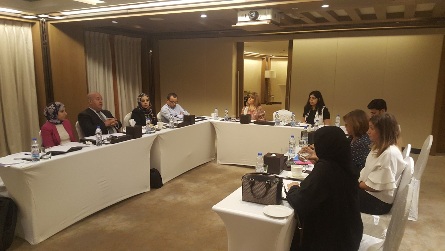| |
Round-table addresses
increasing risk of Human
Papillomavirus (HPV) and
cervical cancer in MENA
region
(Dubai, UAE) -
MSD (NYSE: MRK) recently
hosted a round-table to
address the rising issue of
the Human Papillomavirus (HPV)
and the increasing risk of
cervical cancer in the
Middle East and North Africa
(MENA) region.
The event, attended by
experts from across the
region highlighted the
importance of early
detection and regular
screening for cervical
cancer. The experts also
called for the need for
governments to increase
awareness campaigns around
disease prevention and
screening including the
recommendation of the HPV
vaccine.
Today, cervical cancer is
the most common HPV-related
disease and nearly all cases
of cervical cancer can be
attributed to HPV infection.
As per
the World Health
Organization, in 2012, it
was estimated that cervical
cancer accounted for 528,000
new cases around the world.
It was also estimated that
there were 266,000 deaths
from cervical cancer, with
more than 85% of these
deaths occurring in
less-developed regions.
As of 2017, there were more
than 1.8 million women in
the UAE aged 15 years or
older who may be at risk of
developing cervical cancer.
As per the Information
Centre on HPV and Cancer (ICO),
current estimates indicate
that every year, 93 women in
the country are diagnosed
with cervical cancer, with
28 deaths every year.
Cervical
cancer is a cancer that can
be prevented, yet this type
of cancer is considered the
third most frequent cancer
among women in the UAE and
the second largest cancer
killer among women in this
region.
The link between HPV and
cervical cancer was first
discovered in the mid-1970s,
and since then researchers
have also discovered that
HPV can cause other cancers
in both men and women. In
most cases, HPV clears on
its own; however when the
body does not clear up,
certain HPV types can lead
to cancers and other
diseases in both males and
females.
Dr. Muna Tahlak, Consultant
Obstetrics & Gynaecology &
CEO of Latifa Hospital,
Dubai, UAE,
speaking at the event
said: “We recommend
women to have the HPV
vaccine which is the primary
prevention of cervical
cancer. Early detection
through screening can
prevent the HPV virus
developing into cancer, with
Pap smear screening being
most successful test to
detect cervical cancer at an
early stage. Yet, we are
seeing that most cases of
cervical cancer in the UAE
are presenting for medical
care in the latter stages of
the disease, when chances of
survival are slim and so the
need for increasing
education around
preventative care has never
been greater. ”
Dr. Saad Aswad, Consultant
Gynaecology Oncology and
Chair of the
Obstetrician/Gynaecologist
Department, Tawam Hospital
added “Without proper
screening and the already
available vaccinations which
target HPV being offered to
both women and girls, it has
been predicted that 52 women
will die each day from
cervical cancer in the MENA
region by 2035. To combat
this, across the region,
comprehensive screening and
treatment programs are being
implemented to stop women
and girls dying needlessly
from a preventable cancer.
In particular, Abu Dubai is
leading the fight against
cervical cancer, as since
2008, girls in schools have
been administered the HCP
vaccines free of charge.
Mazen Altaruti, AVP and
Managing Director for MSD in
the GCC,
said: “For more than 125
years, MSD has been
committed to vaccine
research and development. We
believe we have a role and
responsibility in improving
access to vaccines and
quality healthcare in the
gulf. We are committed to
raising awareness about
diseases that vaccines can
help to prevent and to help
adults understand how to
protect their health’.’’
‘’MSD has played an
important part in the
reduction of
vaccine-preventable diseases
to date. It is our
goal to continue to innovate
and improve the environment
for vaccines across the
globe, with a focus on the
UAE and GCC region.’’
Altaruti added.
Introducing a vaccine
against HPV in childhood
immunization programs in the
UAE has helped drastically
reduce the number of women
with cervical cancer.
Until
2017, globally 69 countries
have added HPV vaccination
to their national
immunization program for
girls, and 20 countries also
for boys.
Countries that
have added the HPV vaccine
to their routine
immunization schedules see
protecting their population
against cervical cancer and
other diseases caused by HPV
as a high priority.
MSD is a US-based global
biopharmaceutical company
with operations in more than
140 countries. MSD products
have been present in the
Guff countries for over 30
years targeting such
therapeutic areas as Anti-infectives,
Cardiovascular, Asthma &
Allergy, Diabetes, HCV, HIV,
Pain & Inflammation,
Osteoporosis, Oncology,
Fertility, Ophthalmic, and
Anesthesia in addition to
several specialized Vaccines.
Related
Links/References:
 UAE -
Human Papillomavirus and
Related Cancers, Fact
Sheet 2017
UAE -
Human Papillomavirus and
Related Cancers, Fact
Sheet 2017
 Middle East & North
Africa Cervical Cancer
Crisis Card
Middle East & North
Africa Cervical Cancer
Crisis Card
 PRINT
THIS ARTICLE
PRINT
THIS ARTICLE
|


